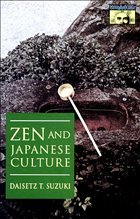One of this century's leading works on Zen, this book is a valuable source for those wishing to understand its concepts in the context of Japanese life and art. In simple, often poetic, language, Daisetz Suzuki describes what Zen is, how it evolved, and how its emphasis on primitive simplicity and self-effacement have helped to shape an aesthetics found throughout Japanese culture. He explores the surprising role of Zen in the philosophy of the samurai, and subtly portrays the relationship between Zen and swordsmanship, haiku, tea ceremonies, and the Japanese love of nature. Suzuki's contemplative discussion is enhanced by anecdotes, poetry, and illustrations showing silk screens, calligraphy, and examples of architecture.
Review:
... As one turns the pages of this delightful book, one seems to catch intimations of how and why certain aspects of the "spirit of Zen' are making themselves felt in America today. . . . (The New York Times)
Table of contents:
Preface
List of Plates
Chronology
I
What Is Zen?
1
II
General Remarks on Japanese Art Culture
19
III
Zen and the Study of Confucianism
39
IV
Zen and the Samurai
59
V
Zen and Swordsmanship I
87
VI
Zen and Swordsmanship II
137
VII
Zen and Haiku
215
VIII
Zen and the Art of Tea I
269
IX
Zen and the Art of Tea II
291
X
Rikyu and Other Teamen
315
XI
Love of Nature
329
Appendices
397
I
Two Mondo from the "Hekigan-shu"
399
II
The Vimalakirti Sutra
410
III
"Yama-uba," a No Play
419
IV
The Swordsman and the Cat
428
V
Chuang-tzu
436
Bibliography
443
Index
449
Review:
... As one turns the pages of this delightful book, one seems to catch intimations of how and why certain aspects of the "spirit of Zen' are making themselves felt in America today. . . . (The New York Times)
Table of contents:
Preface
List of Plates
Chronology
I
What Is Zen?
II
General Remarks on Japanese Art Culture
III
Zen and the Study of Confucianism
IV
Zen and the Samurai
V
Zen and Swordsmanship I
VI
Zen and Swordsmanship II
VII
Zen and Haiku
VIII
Zen and the Art of Tea I
IX
Zen and the Art of Tea II
X
Rikyu and Other Teamen
XI
Love of Nature
Appendices
I
Two Mondo from the "Hekigan-shu"
II
The Vimalakirti Sutra
III
"Yama-uba," a No Play
IV
The Swordsman and the Cat
V
Chuang-tzu
Bibliography
Index
Es gelten unsere Allgemeinen Geschäftsbedingungen: www.buecher.de/agb
Impressum
www.buecher.de ist ein Internetauftritt der buecher.de internetstores GmbH
Geschäftsführung: Monica Sawhney | Roland Kölbl | Günter Hilger
Sitz der Gesellschaft: Batheyer Straße 115 - 117, 58099 Hagen
Postanschrift: Bürgermeister-Wegele-Str. 12, 86167 Augsburg
Amtsgericht Hagen HRB 13257
Steuernummer: 321/5800/1497
USt-IdNr: DE450055826
Bitte wählen Sie Ihr Anliegen aus.
Rechnungen
Retourenschein anfordern
Bestellstatus
Storno

